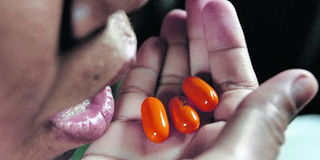Premium
Women’s lives shattered by forced sterilisation in South Africa

A patient taking antiretroviral drugs. PHOTO | FILE | NATION MEDIA GROUP
What you need to know:
In a scathing report published last week where it documented 48 cases of coerced sterilisations, South Africa’s Commission for Gender Equality said it uncovered “cruel, torturous or inhumane and degrading treatment” targeting black women who were mostly HIV-positive.
JOHANNESBURG
Four years ago, Bongekile Msibi, already a mother of a now 15-year-old girl, consulted a doctor after trying unsuccessfully to have a second child.
She was shocked, shattered and bewildered — she said — when the doctor told her that she could not conceive as she did not have a uterus.
“I couldn’t comprehend what the doctor was saying. How possible is that because I have had a baby before?” the 32-year-old said, holding back tears.
She traced her steps back to the only hospital she had ever been admitted to, Johannesburg’s Chris Hani Baragwanath, one of the largest healthcare centres in Africa.
There, she said, an obstetrician nonchalantly told her that her uterus was removed when she had her baby in 2005.
She is one of dozens of women whose lives were wrecked by forced sterilisation conducted at 15 public hospitals in Gauteng and Kwa-Zulu Natal provinces, a recent investigation found.
In a scathing report published last week where it documented 48 cases of coerced sterilisations, South Africa’s Commission for Gender Equality (CGE) said it uncovered “cruel, torturous or inhumane and degrading treatment” targeting black women who were mostly HIV-positive.
The procedures — mostly undocumented in the hospitals’ records — were conducted on women who gave birth via caesarean section between 2002 and 2015.
Msibi was just 17 years old at the time of the procedure and not HIV-positive.
When she returned to the hospital in 2016, she was told the step had been taken to save her life though nobody had informed her at the time.
South African health laws forbid forced or coerced sterilisation, although doctors may sterilise without consent in special circumstances, to save a life.
Tamara Mathebula, who heads the CGE, said the probe revealed that in most cases healthcare professionals told patients that sterilisation was necessary “because you are HIV-positive, because you have TB, because we feel you have too many babies … you are poor, we can’t allow you to continue”.
“But that is not the compelling reason for a doctor to tie your tubes, or to take out your uterus,” she said.
In testimonies to the commission, victims said hospital staff threatened to deny them attention if they refused to sign the consent papers. Others were forced to sign while in extreme pain, unaware of what they were consenting to, the report added.
For Msibi, there was no consent form, nor were there records to show what procedure was done on her. For the past three years, she has waged an uphill battle — writing to, and staging a sit-in at, the health department — in search of answers.
“The department lacks empathy and sympathy. They are very insensitive”, she said at her house in Boksburg, east of Johannesburg.
“It is as if they removed a nail and it will grow back. You are treated like someone who is annoying. I can’t sit back and be OK with the fact that I don’t have a uterus. I don’t even know why I don’t have it.”
After the report was published, the ministry agreed to meet the complainants, but that brings little comfort to the women. (AFP)





